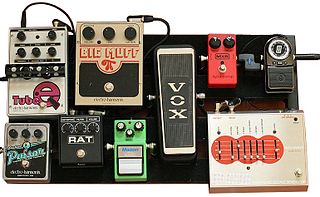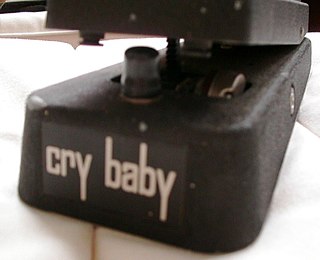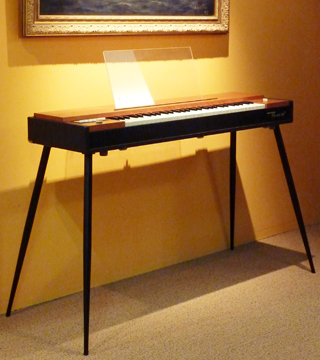Related Research Articles

An effects unit, effects processor, or effects pedal is an electronic device that alters the sound of a musical instrument or other audio source through audio signal processing.

Vox is a British musical equipment manufacturer founded in 1957 by Thomas Walter Jennings in Dartford, Kent, England. The company is most famous for making the Vox AC30 guitar amplifier, used by The Beatles, The Rolling Stones, The Kinks, The Yardbirds, Queen, Dire Straits, U2, and Radiohead; the Vox Continental electric organ, the Vox wah-wah pedal used by Jimi Hendrix, and a series of innovative electric guitars and bass guitars. Since 1992, Vox has been owned by the Japanese electronics firm Korg.

A wah-wah pedal, or simply wah pedal, is a type of effects pedal designed for electric guitar that alters the timbre of the input signal to create a distinctive sound, mimicking the human voice saying the onomatopoeic name "wah-wah". The pedal sweeps a band-pass filter up and down in frequency to create a spectral glide. The wah-wah effect originated in the 1920s, with trumpet or trombone players finding they could produce an expressive crying tone by moving a mute in, and out of the instrument's bell. This was later simulated with electronic circuitry for the electric guitar when the wah-wah pedal was invented. It is controlled by movement of the player's foot on a rocking pedal connected to a potentiometer. Wah-wah effects may be used without moving the treadle as a fixed filter to alter an instrument’s timbre, or to create a "wacka-wacka" funk-styled rhythm for rhythm guitar playing.

A guitar amplifier is an electronic device or system that strengthens the electrical signal from a pickup on an electric guitar, bass guitar, or acoustic guitar so that it can produce sound through one or more loudspeakers, which are typically housed in a wooden cabinet. A guitar amplifier may be a standalone wood or metal cabinet that contains only the power amplifier circuits, requiring the use of a separate speaker cabinet–or it may be a combo amplifier, which contains both the amplifier and one or more speakers in a wooden cabinet. There is a wide range of sizes and power ratings for guitar amplifiers, from small, lightweight practice amplifiers with a single 6-inch speaker and a 10-watt amp to heavy combo amps with four 10-inch or four 12-inch speakers and a 100-watt amplifier, which are loud enough to use in a nightclub or bar performance.

The Clavinet is an electric clavichord invented by Ernst Zacharias and manufactured by the Hohner company of Trossingen, West Germany, from 1964 to 1982. The instrument produces sounds with rubber pads, each matching one of the keys and responding to a keystroke by striking a given point on a tensioned string, and was designed to resemble the Renaissance-era clavichord.

Peavey Electronics Corporation is a privately-owned American company which designs, develops, manufactures, and markets professional audio equipment. Headquartered in Meridian, Mississippi, Peavey is one of the largest audio equipment manufacturers in the world.

Dunlop Manufacturing, Inc. is a manufacturer of musical accessories, especially effects units, based in Benicia, California, United States. Founded in 1965 by Jim Dunlop Sr., the company grew from a small home operation to a large manufacturer of music gear. Dunlop has acquired several well-known effects pedal brands, including Cry Baby, MXR and Way Huge.
Hughes & Kettner is a German manufacturer of instrument amplifiers, cabinets and effects boxes.
Morley Pedals is the name of a guitar effects pedal company, famous for manufacturing wah-wah pedals and other treadle type effects for guitar. Morley pedals use electro-optical circuitry rather than a potentiometer to control the effect. The foot treadle controls a shutter inside the pedal that in turn controls the amount of light reaching a photoresistor. The advantage to this system is that there are no potentiometers in the signal path to wear out and become "scratchy sounding" over time. Electro-optical circuitry is used throughout the classic Morley pedal line, which includes or has included volume pedals, delay pedals, chorus and phaser pedals, and many others.

Ampeg is a manufacturer best known for its bass amplifiers.

Sovtek is a brand of vacuum tube owned by Mike Matthews's New Sensor Corporation and manufactured in Saratov, Russia. They are often used in guitar amplification and include versions of the popular 12AX7, EL84, EL34, and 6L6 vacuum tubes. Many of the vacuum-tube amplifiers in modern production are factory-fitted with Sovtek valves. Originally, Sovtek guitar amplifier valves were claimed to have been descendants of earlier wartime Russian-made components and carried blast proof capabilities. This, however, was later dispelled as urban myth, attributed to a sales person who promoted early product at music industry trade shows worldwide.

The Ibanez Tube Screamer is an overdrive pedal made by Ibanez. First developed by Maxon as a competitor to the Boss OD-1, it was sold outside of Japan under the Ibanez brand and became popular among guitarists for its characteristic mid-boosted tone and amp-like distortion. The Tube Screamer has gone through multiple iterations since its debut in 1979, notably the original TS808 model and its successor, the TS9. Many guitarists have used it to create their signature sound, and it is considered one of the most successful, widely copied, and modified overdrive pedals in the history of the electric guitar.

Musitronics, often shortened to Mu-tron, was a manufacturer of electronic musical effects active in the 1970s. Founded by Mike Beigel and Aaron Newman, the company's products provided filtering and processing effects and were derived from synthesizer components. The company was known for producing high-quality products with many user-adjustable parameters, but high production costs and a failed product line, the Gizmotron, caused its downfall.

Clyde Lee McCoy, was an American jazz trumpeter whose popularity spanned seven decades. He is best remembered for his theme song, "Sugar Blues", written by Clarence Williams and Lucy Fletcher, and also as a co-founder of Down Beat magazine in 1935. The song hit in 1931 and 1935, in Columbia and Decca versions, and returned to Billboard magazine's Country (Hillbilly) chart in 1941. It was also played with vocals, by Bob Wills and his Texas Playboys, Fats Waller and Ella Fitzgerald.

The Fuzz Face is an effects pedal for electric guitar, used also by some electric bass players. It is designed to produce a distorted sound referred to as "fuzz", originally achieved through accident such as broken electrical components or damaged speakers.
Budda may refer to:

Suhr Guitars is an American company that manufactures electric guitars and basses, guitar amplifiers, and effect units. The company is based in Lake Elsinore, California and was founded in 1997 by John Suhr, who "has a reputation for building exquisitely crafted guitars" and Steve Smith.
Keeley Electronics is an American manufacturer of effect units for electric guitars. The company, founded by Robert Keeley and operating from Oklahoma City, Oklahoma, started with the Keeley Compressor pedal along with modifications for effects by Boss and Ibanez.

Vintage musical equipment is older music gear, including instruments, amplifiers and speakers, sound recording equipment and effects pedals, sought after, maintained and used by record producers, audio engineers and musicians who are interested in historical music genres. While any piece of equipment of sufficient age can be considered vintage, the term is typically applied to instruments and gear from the 1970s and earlier. Guitars, amps, pedals, electric keyboards, sound recording equipment from the 1950s to 1970s are particularly sought after, while musical equipment from the 1940s and earlier is generally far more expensive and sought out mainly by museums or collectors to preserve historical equipment, rather than to perform with.

Friedman Amplification is an American company that produces guitar amplifiers, electric guitars, and related accessories. Founded in 2008 by Dave Friedman, the company has become a popular boutique amp maker.
References
- ↑ Lucas, Anthony. "Behind Budda". Premier Guitar Magazine. Retrieved 20 February 2012.
- 1 2 3 Feser, Phil. "Budda 10th Ann. Limited Edition Twinmaster". Vintage Guitar Magazine. Retrieved 20 February 2012.
- ↑ "Budda Twinmaster 18w 1x12" Combo Amp". Premier Guitar Magazine. Retrieved 20 February 2012.